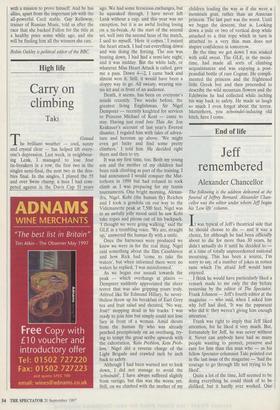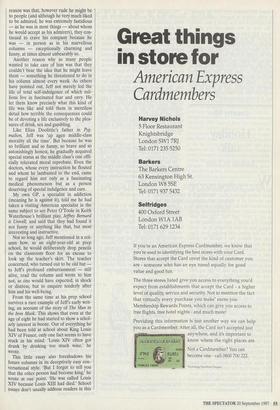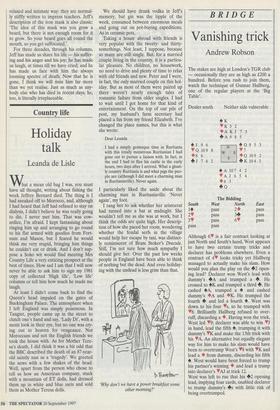End of life
Jeff remembered
Alexander Chancellor
The following is the address delivered at the funeral of Jeffrey Bernard. Alexander Chan- cellor was the editor under whom Jeff began his 'Low life' column.
It was typical of Jeff's theatrical side that he should choose to die — and it was a choice, for although he had been officially about to die for more than 30 years, he didn't actually do it until he decided to at a time of totally unprecedented national mourning. This has been a source, I'm sorry to say, of a number of jokes in rotten taste which I'm afraid Jeff would have enjoyed.
I think he would have particularly liked a remark made to me only the day before yesterday by the editor of The Spectator, Frank Johnson — Jeff's fourth editor at the magazine — who said, when I asked him why Jeff had died, 'It was the paparazzi who did it: they weren't giving him enough attention.'
Frank was right to imply that Jeff liked attention, for he liked it very much. But, fortunately for Jeff, he was never without it. Never can anybody have had so many people wanting to protect, preserve and care for him than this man who — as his fellow Spectator columnist Taki pointed out in the last issue of the magazine — 'had the courage to go through life not trying to be liked'.
Quite a lot of the time, Jeff seemed to be doing everything he could think of to be disliked, but it hardly ever worked. One reason was that, however rude he might be to people (and although he very much liked to be admired, he was extremely fastidious — as he was in most things — about whom he would accept as his admirers), they con- tinued to crave his company because he was — in person as in his marvellous columns — exceptionally charming and funny, at times almost unbearably so.
Another reason why so many people wanted to take care of him was that they couldn't bear the idea that he might leave them — something he threatened to do in his column almost every week. As others have pointed out, Jeff not merely led the life of total self-indulgence of which mil- lions live in fascinated fear and envy. He let them know precisely what this kind of life was like and told them in merciless detail how terrible the consequences could be of devoting a life exclusively to the plea- sures of drink, sex and gambling.
Like Eliza Doolittle's father in Pyg- malion, Jeff was 'up agen middle-class morality all the time'. But because he was so brilliant and so funny, so brave and so astonishingly honest, he gradually acquired special status as the middle class's one offi- cially tolerated moral reprobate. Even the doctors, whose every instruction he flouted and whom he lambasted to the end, came to regard him not only as a fascinating medical phenomenon but as a person deserving of special indulgence and care.
My own GP, a specialist in addiction (meaning he is against it), told me he had taken a visiting American specialist in the same subject to see Peter O'Toole in Keith Waterhouse's brilliant play, Jeffrey Bernard is Unwell, and said that they had found it not funny or anything like that, but most interesting and instructive.
Not so long ago, Jeff mentioned in a col- umn how, as an eight-year-old at prep school, he would deliberately drop pencils on the classroom floor for an excuse to look up the teacher's skirt. The teacher concerned, who turned out to be old but to Jeff's profound embarrassment — still alive, read the column and wrote to him not, as one would have expected, in shock or distress, but to enquire tenderly after him and his well-being.
From the same time at his prep school survives a rare example of Jeff's early writ- ing, an account of the story of The Man in the Iron Mask. This shows that even at the age of eight he had started to show a schol- arly interest in booze. Out of everything he had been told at school about King Louis XIV of France, only one fact seems to have stuck in his mind. 'Louis XIV often got drunk by drinking too much wine,' he wrote.
This little essay also foreshadows his future columns in its deceptively easy con- versational style. 'But I forgot to tell you that the other person had become king,' he wrote at one point. 'He was called Louis XIV because Louis XIII had died.' School essays don't usually address readers in this relaxed and intimate way: they are normal- ly stiffly written to impress teachers. Jeff's description of the iron mask is also classic: `The idea of this mask was you grow a beard, but there is not enough room for it to grow. So your beard goes all round the mouth, so you get suffocated.'
For three decades, through his columns, Jeff has made us share his life — his suffer- ing and his anger and his joy; he has made us laugh, at times till we have cried; and he has made us face with him the always looming spectre of death. Now that he is gone, I think we will miss him far more than we yet realise. Just as much as any- body else who has died in recent days, he, too, is literally irreplaceable.




































































 Previous page
Previous page